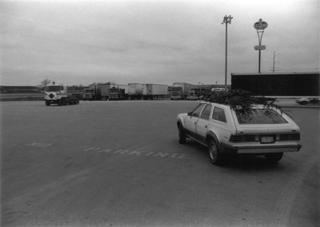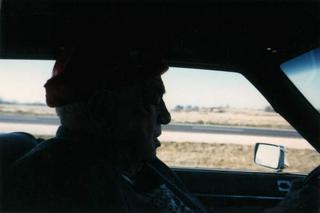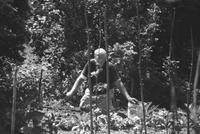skelgas
One day while Carl and I were at the cabin, the stove stopped working. It didn't take us too long to figure out that we had run out of gas. We drove into town later that day and went to the gas place. I think it was across the street from the IGA grocery store. We ordered a replacement cylinder of gas, and told them where the cabin was.
They had a showroom area with some gas appliances. There were some water heaters, stoves and clothes driers. One of the more interesting appliances was a gas powered toilet. It was a toilet seat on a metal box, with a metal cabinet behind it, and a vent pipe which would be directed to the outside. I was fascinated by this alternative to the outhouse. Evidently, the device burned the human waste so completely that there would be only a fine sterile ash left when it was done, a few tablespoon's worth per use.
It seemed a little extravagant to me somehow, especially since it was well over a thousand dollars, not counting installation and operating costs. But I guess it was worth it in some situations, where people didn't want an outhouse and didn't have plumbing. There are some places where soil conditions or environmental considerations won't allow for an outhouse, so this would be a workable solution.
The gas was delivered the next day, and the stove was back in business in time for lunch. It looked like they had changed the kind of gas cylinders they used, because the old thin green gas cylinder was replaced by a shorter thicker silver one.
The day after that, we went back into town to buy some supplies for fixing some things and re-roofing part of the cabin. Grandad had promised to reimburse us for any expenses we had, so after we got the supplies, I called grandad and read him the information from the receipts. I told him we had run out of gas, and gotten more, and read off the amount, and the name of gas place on the receipt.
Grandad said, "What? You got the gas there? Damn it, we get our gas from the hardware store!"
I told him I had no idea the hardware store sold gas, we needed gas, so we went to the gas place. He wasn't too pleased, but what was done was done, and he said he'd send us a money order.
It made more sense then, the different kind of gas cylinder. I felt bad for depriving the old guys at the hardware store of some business. Then I wondered what had happened with the old gas cylinders. Maybe the gas place and the hardware store had some kind of agreement to give each other the old gas cylinders when someone switched suppliers, or maybe they just used whatever cylinders they got. I wondered if the hardware store guys would get their empty cylinders back and think that grandad decided not to buy gas from them any more.
When we drove back by the hardware store, I noticed a little SKELGAS sign next to the hardware store sign.
They had a showroom area with some gas appliances. There were some water heaters, stoves and clothes driers. One of the more interesting appliances was a gas powered toilet. It was a toilet seat on a metal box, with a metal cabinet behind it, and a vent pipe which would be directed to the outside. I was fascinated by this alternative to the outhouse. Evidently, the device burned the human waste so completely that there would be only a fine sterile ash left when it was done, a few tablespoon's worth per use.
It seemed a little extravagant to me somehow, especially since it was well over a thousand dollars, not counting installation and operating costs. But I guess it was worth it in some situations, where people didn't want an outhouse and didn't have plumbing. There are some places where soil conditions or environmental considerations won't allow for an outhouse, so this would be a workable solution.
The gas was delivered the next day, and the stove was back in business in time for lunch. It looked like they had changed the kind of gas cylinders they used, because the old thin green gas cylinder was replaced by a shorter thicker silver one.
The day after that, we went back into town to buy some supplies for fixing some things and re-roofing part of the cabin. Grandad had promised to reimburse us for any expenses we had, so after we got the supplies, I called grandad and read him the information from the receipts. I told him we had run out of gas, and gotten more, and read off the amount, and the name of gas place on the receipt.
Grandad said, "What? You got the gas there? Damn it, we get our gas from the hardware store!"
I told him I had no idea the hardware store sold gas, we needed gas, so we went to the gas place. He wasn't too pleased, but what was done was done, and he said he'd send us a money order.
It made more sense then, the different kind of gas cylinder. I felt bad for depriving the old guys at the hardware store of some business. Then I wondered what had happened with the old gas cylinders. Maybe the gas place and the hardware store had some kind of agreement to give each other the old gas cylinders when someone switched suppliers, or maybe they just used whatever cylinders they got. I wondered if the hardware store guys would get their empty cylinders back and think that grandad decided not to buy gas from them any more.
When we drove back by the hardware store, I noticed a little SKELGAS sign next to the hardware store sign.
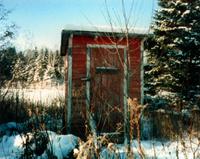
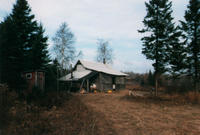
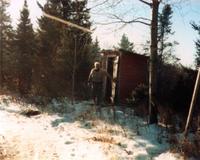
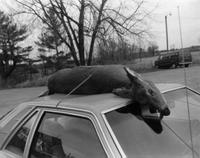 A lot of times on the way back to grandad's house after deer hunting at the shack, I would see cars heading back south with a deer strapped to the roof or across the trunk or even the hood. We always brought some extra rope or clothes line to tie a deer to the roof if one of us got one, but the only thing we ever came back with strapped to the roof was Christmas trees. That was usually the last major task we did before leaving the shack. Sometimes grandad would have already seen the candidate tree and remembered where it was, and we'd go right to it. Other times we'd slowly drive along the logging roads looking for a nice tree in relatively easy reach. Often we would get two trees, one for grandad and Carolyn, and one for uncle Bill and aunt JoAn, or someone else who needed a tree.
A lot of times on the way back to grandad's house after deer hunting at the shack, I would see cars heading back south with a deer strapped to the roof or across the trunk or even the hood. We always brought some extra rope or clothes line to tie a deer to the roof if one of us got one, but the only thing we ever came back with strapped to the roof was Christmas trees. That was usually the last major task we did before leaving the shack. Sometimes grandad would have already seen the candidate tree and remembered where it was, and we'd go right to it. Other times we'd slowly drive along the logging roads looking for a nice tree in relatively easy reach. Often we would get two trees, one for grandad and Carolyn, and one for uncle Bill and aunt JoAn, or someone else who needed a tree.